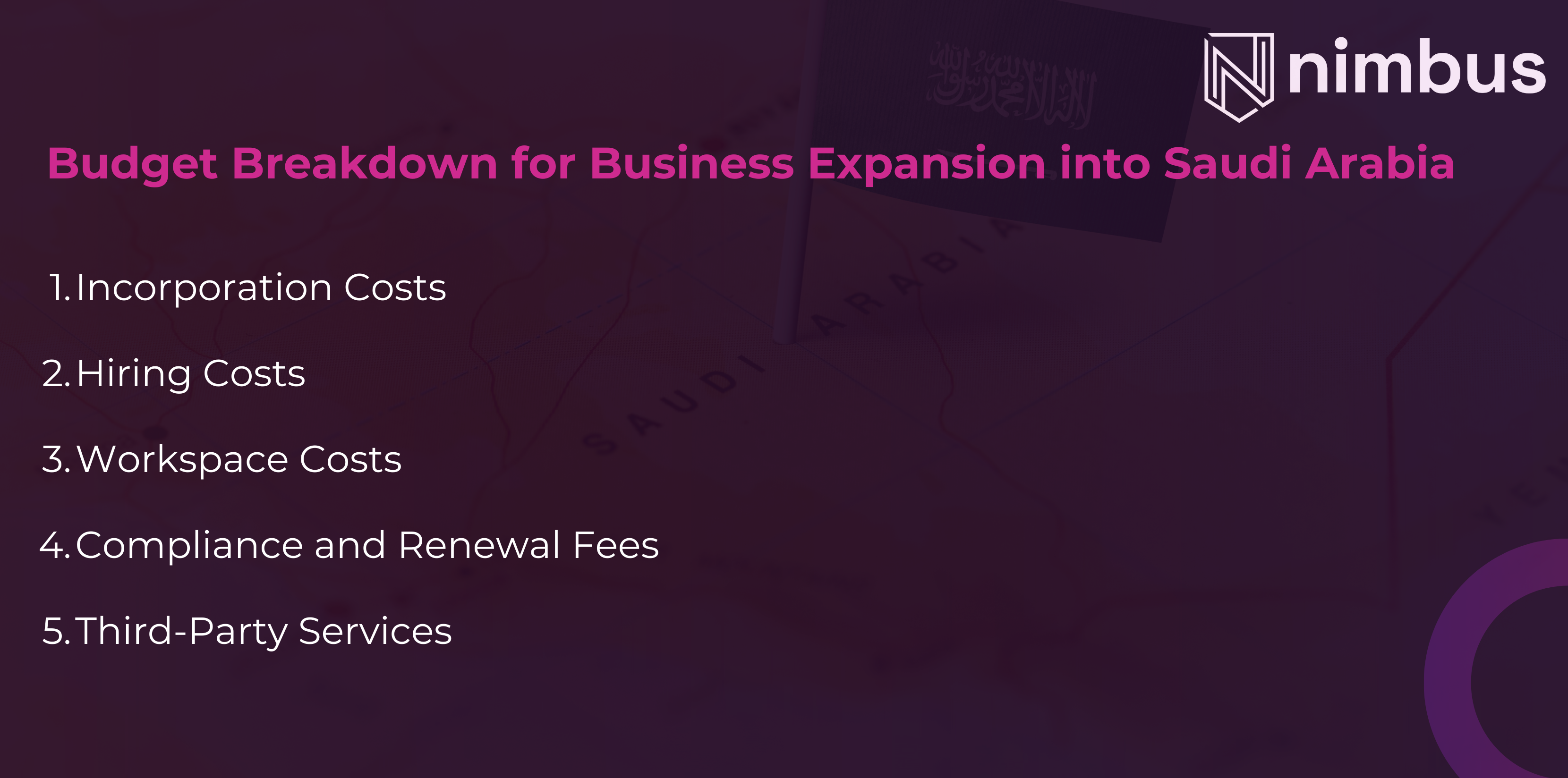Expanding into Saudi Arabia is an exciting opportunity for businesses looking to tap into one of the fastest-growing economies in the world. With transformative initiatives under Vision 2030, the Kingdom has been actively diversifying its economy, attracting foreign investors, and creating new business opportunities across various industries.
However, successful market entry requires careful financial planning. Understanding the cost breakdown and budgeting for each stage of expansion is crucial to ensuring a smooth setup and long-term sustainability.
This post breaks down the process that helps investors with budgeting in business expansion in the KSA, helping businesses plan effectively for a successful launch.
1. The Four Stages of Saudi Market Expansion
Entering the Saudi market involves several steps, from obtaining licenses to hiring employees and ensuring full compliance with government regulations. Businesses typically go through four key stages in the expansion process:
– Initial Setup Stage – This includes getting all necessary documents attested like the certificate of incorporation, memorandum of association (MoA), articles of association (AoA), and audited financial statements.
Companies must also register with over ten ministries and governmental entities as part of the setup roadmap. Securing a business location and obtaining a national address are also mandatory at this stage.
– Soft Landing Stage – Companies must issue a general manager’s residence permit and complete registration on essential government platforms, including Muqeem, Absher, Qiwa, and Mudad. Opening a business bank account is also critical at this stage.
– Post-Setup Stage – Businesses need to hire staff in compliance with Saudi labor laws and Saudization quotas, issue work visas for non-Saudi employees, and complete legal due diligence. Many companies opt for third-party service providers to handle payroll, accounting, and compliance tasks.
– Growth and Compliance Stage – Once the business is operational, maintaining compliance with Saudi regulations is crucial. This includes renewing licenses, keeping financial records updated, and ensuring all legal and taxation requirements are met.
2. Budget Breakdown for Business Expansion into Saudi Arabia

Expanding a business into Saudi Arabia requires careful financial planning. Below is a breakdown of the estimated budget associated with market entry for the first year.
– Incorporation Costs
- Covers the full setup process, including legal registrations, licensing, and document attestation.
- Fees may vary depending on the nature of the business and the complexity of registration.
– Hiring Costs
- Hiring a general manager (GM) in Saudi Arabia typically costs between SR20,000 and SR25,000 per month.
- The salary range for Saudi nationals varies from SR5,000 to SR12,000 per month, depending on experience and industry.
- Businesses must comply with Saudization quotas, which require a certain percentage of local hires.
- Working with a business expansion platform can help companies streamline recruitment and ensure compliance with labor laws.
– Workspace Costs
- Businesses must secure office space, whether through a shared workspace or a private office.
- The most affordable shared workspaces start at around SR20,000 per year.
- Costs will vary depending on the location and size of the office.
– Compliance and Renewal Fees
- Covers government fees for renewing business licenses and maintaining up-to-date records on key government portals.
- Businesses should account for renewal costs in their first-year budget to avoid disruptions.
– Third-Party Services
- Many companies choose to outsource payroll management, accounting, auditing, and PRO services to ensure compliance.
- Engaging third-party service providers helps businesses navigate regulatory requirements efficiently.
3. Common Tax Expenses for Foreign Businesses in Saudi Arabia
Saudi Arabia’s tax landscape is continuously evolving to align with its Vision 2030 economic transformation plan. Foreign businesses should be aware of the following tax obligations:
- alue-Added Tax (VAT) – Currently set at 15% and applies to most goods and services.
- Corporate Income Tax – Levied at 20% on net adjusted profits or on the share of the business owned by non-Saudis.
- Withholding Tax (WHT) – Ranges from 5% to 20%, depending on the nature of the transaction and the recipient’s country of residence.
Understanding these tax implications is crucial for financial planning and maintaining compliance with Saudi regulations.
– Estimating Business Expansion Costs with Nimbus Consultancy
Planning an entry into Saudi Arabia involves both fixed and variable costs, which can be difficult to predict. To address this challenge, Nimbus Consultancy helps businesses estimate expansion-related expenses with greater accuracy.
We help businesses generate a rough cost analysis based on their provided details. Businesses can schedule a consultation call with professionals of Nimbus Consultancy.
Are You Ready for Business Setup in Saudi Arabia?
Expanding into Saudi Arabia presents vast opportunities, but long-term success requires strategic budgeting. Understanding the financial aspects of market entry, including incorporation costs, hiring expenses, taxation, and compliance fees, helps businesses prepare for a strong foundation into the Kingdom.
By working with experienced market entry specialists, companies can navigate the complexities of Saudi expansion, ensure financial stability, and take full advantage of the Kingdom’s high-growth potential.



